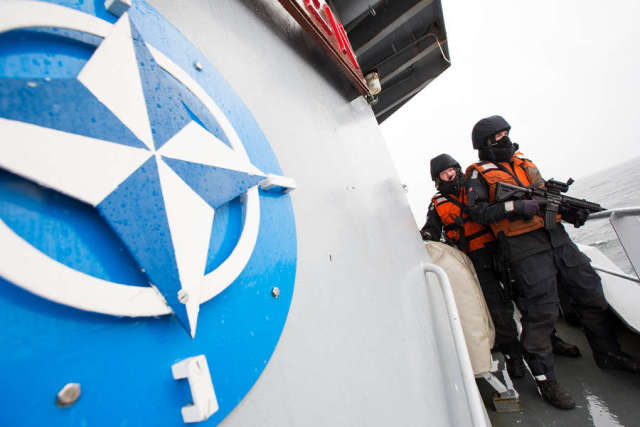Experts told what threatens Russia with the accession of Sweden and Finland to NATO
NATO ships have entered the Baltic Sea, where they will take part in exercises. Earlier, the media reported that Sweden and Finland could become NATO members. "Newspaper.Ru" figured out how the membership of these countries in the alliance would affect the Baltic Fleet of Russia.
"Part of the ships of the permanent naval rapid Reaction group of NATO SNMG1 entered the Baltic Sea. They will take part in exercises with partner States and allied countries. The main task of the alliance's military is to demonstrate the presence of allies in the Baltic Sea region," the Estonian broadcasting company ERR said.
The group includes: the flagship, the Dutch frigate HNLMS De Zeven Provincien, the German tanker ship FGS Berlin, the British frigates HDMS Peter Willemoes and HMS Northumberland, as well as the German corvette FGS Erfurt.
Before that, the Swedish media, citing government sources, reported that Swedish Prime Minister Magdalena Andersson plans to apply for NATO membership in June 2022. The position on joining the alliance will be discussed at a special congress of the ruling party of Sweden on May 24.
Swedish Foreign Minister Anne Linde said that the country is considering all possibilities of relations with NATO and is discussing this issue with colleagues from Finland. The minister also said that Moscow should not threaten Stockholm and Helsinki in any way.
Finnish Prime Minister Sanna Marin said that the country's parliament will discuss the country's membership in NATO. She expressed hope that this issue will be resolved by the summer.
The official representative of the Ministry of Foreign Affairs of Russia, Maria Zakharova, said that the governments of Sweden and Finland should be aware of what the proposed accession to NATO could lead to. "They will automatically find themselves on the NATO "front line". Moreover, membership in NATO actually implies the renunciation of part of sovereignty," Zakharova warned.
Program Director of the Valdai International Discussion Club, Professor of MGIMO and RAS Oleg Barabanov in an interview with Gazeta.Ru" called the desire of Sweden and Finland to join NATO a political decision, since "no one is going to attack these countries." "There will be no practical benefit from this. But there will be no harm either," said Barabanov.
In turn, political scientist, editor-in-chief of the magazine "Russia in Global Politics" Fyodor Lukyanov noted that although membership in NATO assumes that in the event of an attack on one of the countries of the alliance, all the others, including the United States, will fight on its side, the regime of joining military action in the event of a conflict is "not quite clear."
"It is believed that the fifth article of the NATO Charter on collective security obliges member countries to defend any country of the alliance as themselves in the event of an attack. But there is a point of view that in fact the fifth article does not include such automatism," Lukyanov said.
A military expert, retired 1st rank captain Nikolai Pavlenko, noted that the entry of Sweden and Finland into the North Atlantic Alliance would create a "geographically unfavorable situation for Russia in the Baltic."
"If you look at the map, Russia has very small "islands of entry" into the Baltic Sea. These are Kaliningrad and St. Petersburg. From the south, the coast is controlled by Estonia, Latvia, Lithuania, Poland, and partly Germany. And the northern coast was neutral until recently - this is just Sweden and Finland. If they join NATO, the Baltic coast will be controlled by the alliance by 80-90%. Thus, NATO is simply surrounding the Russian Baltic Fleet. It is geographically very uncomfortable," Pavlenko explained.
The expert added that in practice this could turn into a permanent duty of alliance ships off the coasts of Sweden and Finland. "This has not happened before, respectively, our fleet will need to coordinate all its maneuvers with them - there is such a practice. It's uncomfortable and very nervous. The Baltic is small and a "crowd" of warships there will kill all logistics, and may lead to dangerous incidents," Pavlenko added.
At the same time, globally for Russia, if Sweden and Finland join the military alliance, military threats will not grow very much, Barabanov stressed.
According to him, it is Finland, not Sweden, that threatens Russia more with joining NATO. "As for the impact on Russia, the impact will be greater when Finland joins NATO, since we have a common border with this country, and NATO troops can also be stationed there. I don't expect big changes from Sweden in the current conditions," Barabanov said.
"The landscape of European security has changed dramatically over the past couple of months and has gone into a military confrontation mode. NATO's eastern flank is being strengthened, American forces and weapons are being transferred," Lukyanov summed up.
Denis Telmanov

